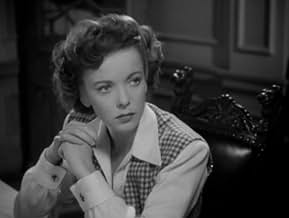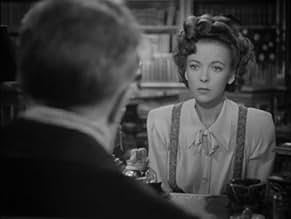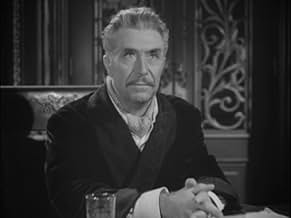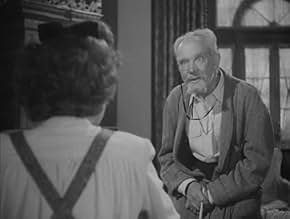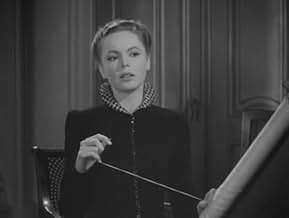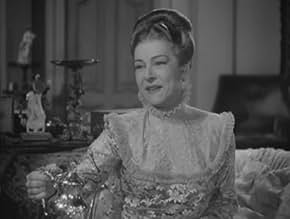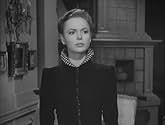AVALIAÇÃO DA IMDb
6,6/10
639
SUA AVALIAÇÃO
Adicionar um enredo no seu idiomaA young woman traveling to Poland with her employer meets a count, and they fall in love as World War II begins.A young woman traveling to Poland with her employer meets a count, and they fall in love as World War II begins.A young woman traveling to Poland with her employer meets a count, and they fall in love as World War II begins.
- Direção
- Roteiristas
- Artistas
Alla Nazimova
- Zofia Orwid
- (as Nazimova)
Harry Adams
- Ballet Attendee
- (não creditado)
Alex Akimoff
- Wine Seller
- (não creditado)
Sylvia Arslan
- Naneczka
- (não creditado)
Lynn Baggett
- Friend of Count Orvid
- (não creditado)
George Blagoi
- Polish Peasant
- (não creditado)
John Bleifer
- Wladek
- (não creditado)
Paul Bradley
- Ballet Attendee
- (não creditado)
Cyd Charisse
- Ballerina
- (não creditado)
Gino Corrado
- Peasant at Party
- (não creditado)
- …
Julius Cramer
- Polish Diplomat
- (não creditado)
Jane Crowley
- Party Guest
- (não creditado)
- Direção
- Roteiristas
- Elenco e equipe completos
- Produção, bilheteria e muito mais no IMDbPro
Avaliações em destaque
A bit slow moving but nonetheless interesting. The only thing missing is Maria Ouspenskaya stirring a boiling cauldron.
Paul Henried and Ida Lupino fall in love near Warsaw. She's a British commoner employed by a fancy English antique collector. Paul and Ida meet by accident in an antique shop. After they do some innocent and tender kanoodling for a while, Paul decides to bring Ida home to meet the Fockers...oops...I mean the royal Orvid family.
Only philosophical uncle Leopold Baruta likes Ida. Paul's sister,Janina, hates her while the rest of the Orvids think she's not good enough for Paul. In the meantime, we encounter a guy who's supporting them all-- Count Pavel. The reason why he's a Count is because everyone watches him count his money to then disperse to them as monthly stipends.
Count Pavel is also a representative of Poland to Nazi Germany and he's convinced that, after Czechoslovakia, Hitler had no more territorial designs on Europe so it would be a good idea to give him the Polish Corridor so as not to tick him off into attacking Poland.
Ida begins to dislike the whole Orvid family and especially Paul's reliance on Pavel for dough. So she's about to hop a train to get her back to England when Paul promises to become independent and she buys into it. So they marry, start teaching the peasants how to till the land while Pavel seethes because this is no way for Polish nobility to act.
On Sept,1.1939, the Nazis invade Poland and begin bombing Warsaw. Paul puts on his military uniform and heads for battle. Ida is left home and somehow, she rallies the peasants into fighting the Germans which history proves to be an absurdity. She teaches them the "scorched earth" policy which history teaches was anachronistic because it was the Russians who employed it against the Nazis after 6/22/41.
However despite its flaws,it all makes for an interesting anti-Nazi, morale boosting film for us at home.
Paul Henried and Ida Lupino fall in love near Warsaw. She's a British commoner employed by a fancy English antique collector. Paul and Ida meet by accident in an antique shop. After they do some innocent and tender kanoodling for a while, Paul decides to bring Ida home to meet the Fockers...oops...I mean the royal Orvid family.
Only philosophical uncle Leopold Baruta likes Ida. Paul's sister,Janina, hates her while the rest of the Orvids think she's not good enough for Paul. In the meantime, we encounter a guy who's supporting them all-- Count Pavel. The reason why he's a Count is because everyone watches him count his money to then disperse to them as monthly stipends.
Count Pavel is also a representative of Poland to Nazi Germany and he's convinced that, after Czechoslovakia, Hitler had no more territorial designs on Europe so it would be a good idea to give him the Polish Corridor so as not to tick him off into attacking Poland.
Ida begins to dislike the whole Orvid family and especially Paul's reliance on Pavel for dough. So she's about to hop a train to get her back to England when Paul promises to become independent and she buys into it. So they marry, start teaching the peasants how to till the land while Pavel seethes because this is no way for Polish nobility to act.
On Sept,1.1939, the Nazis invade Poland and begin bombing Warsaw. Paul puts on his military uniform and heads for battle. Ida is left home and somehow, she rallies the peasants into fighting the Germans which history proves to be an absurdity. She teaches them the "scorched earth" policy which history teaches was anachronistic because it was the Russians who employed it against the Nazis after 6/22/41.
However despite its flaws,it all makes for an interesting anti-Nazi, morale boosting film for us at home.
It is unusual to see a film made during the Second World War by Warner Bros. that deals with Poland, but here we have this seldom seen gem starring Ida Lupina and Paul Henreid. Lupino plays an English tourist in Warsaw on an antique buying mission when she falls in love with a Polish count, played sensitively by Henreid. They move to his estate and attempt to modernize the farm operations, but the German invasion of Poland throws their lives into turmoil.
Ida Lupino gave an outstanding performance as Jennifer Whittredge who is a young British lady who is a companion for a rich lady who loves to eat candy all day long and looks like it. Jennifer visits Poland in 1939 with her employer and go to visit various antique shops in order to bring back items to sell in London. Jennifer meets Paul Henreid, (Count Stephen Orvid) who is from a Royal Family in Poland and immediately is charmed by Jennifer's sweet looks and innocence. Count Stephen is a ladies man and enjoys dating many women, but Jeffinfer catches his eye and then his heart strings and they both fall deeply in love. This royal family become very upset when Stephen and Jennifer tell them they are going to get married, however these two love birds stand firm against the family and start to change their old ways and customs. Hitler is starting his war campaign in 1939 and double talks the Polish Government to believe he will sign a pack of peace with the Polish nation and then attacks their country and burns Warsaw to the ground. This is when the story gets interesting and it shows how the Polish nation fights back against the Nazi Dictator. Great film, great acting and Lupino and Henreid gave outstanding performances and a very good story.
IDA LUPINO is a British young woman visiting Poland and acting as a companion to MARY BOLAND, a wealthy woman fond of collecting antiques. At an antique shop, Ida runs into PAUL HENRIED, who thinks she works at the store. They meet and fall in love, and Ida discovers that he's a Polish count. He insists on showing her around Warsaw and in a few short days they fall in love and, although Ida has misgivings when she meets his family and fails to pass inspection, they do marry.
Then the Nazi invasion of Poland looms over the story for the second half of the film. The script is articulate and literate, dealing as it does with the aristocracy for the most part, but terribly slow-moving and Vincent Sherman's direction fails to give the script the pace it needs to maintain interest.
Ida plays a more rational and less intense creature than she usually does and gives an assured performance as the British girl who must adjust to her new husband and his family. NANCY COLEMAN is his regal, spoiled sister, NAZIMOVA is his party-loving mother, and VICTOR FRANCEN is Henried's wealthy uncle, a Count who keeps the family financially solvent.
But Poland is unable to avoid falling into Hitler's clutches and the story veers into more serious territory with the advent of war and the decision that Henried must make with regard to Poland under Nazi rule.
Summing up: A bit tedious at times, but interesting for the performances of Lupino, Henried, Coleman, Francen, Nazimova, Mary Boland and Franz Waxman's melodramatic score.
Then the Nazi invasion of Poland looms over the story for the second half of the film. The script is articulate and literate, dealing as it does with the aristocracy for the most part, but terribly slow-moving and Vincent Sherman's direction fails to give the script the pace it needs to maintain interest.
Ida plays a more rational and less intense creature than she usually does and gives an assured performance as the British girl who must adjust to her new husband and his family. NANCY COLEMAN is his regal, spoiled sister, NAZIMOVA is his party-loving mother, and VICTOR FRANCEN is Henried's wealthy uncle, a Count who keeps the family financially solvent.
But Poland is unable to avoid falling into Hitler's clutches and the story veers into more serious territory with the advent of war and the decision that Henried must make with regard to Poland under Nazi rule.
Summing up: A bit tedious at times, but interesting for the performances of Lupino, Henried, Coleman, Francen, Nazimova, Mary Boland and Franz Waxman's melodramatic score.
Ida Lupino and Paul Henreid both were very good actors, but very often they were either cast as either supporting actors or starred in smaller and less prestigious films. Here, however, Warner Brothers put both of them in a top film and gave them both a chance to shine--and they were more than up to the task. In particular, Lupino was lovely. Her performance was strong but also with a lot of style--she really was in her element here.
The film begins in the mid-late 1930s in Poland. Ida and her boss (Mary Boland) are visiting the country to buy antiques to take back to Boland's business in England. Shortly after the story begins, a local nobleman (Henreid) meets Lupino and is obviously smitten with her. When he asks her to marry him, there is a bit of a scandal within the family--after all, she is just a commoner. This romance and its repercussions make up the first 2/3 of the film.
At the same time, there are small hints here and there about the upcoming invasion of Poland by the Nazis--something with which audiences of 1944 would have been well acquainted. Eventually, the Nazi hoards invade and Henreid is called to active duty and the inevitable conquest begins.
Overall, there is a lot to like about this film. As I said above, the acting is very, very good. Plus, Henreid and Lupino are ably assisted by various supporting actors that also rise to the occasion. The direction and cinematography are also first-rate. These factors, combined with a good story, make for a very good film--a propaganda film with greater depth than usual and which is still very watchable today.
The film begins in the mid-late 1930s in Poland. Ida and her boss (Mary Boland) are visiting the country to buy antiques to take back to Boland's business in England. Shortly after the story begins, a local nobleman (Henreid) meets Lupino and is obviously smitten with her. When he asks her to marry him, there is a bit of a scandal within the family--after all, she is just a commoner. This romance and its repercussions make up the first 2/3 of the film.
At the same time, there are small hints here and there about the upcoming invasion of Poland by the Nazis--something with which audiences of 1944 would have been well acquainted. Eventually, the Nazi hoards invade and Henreid is called to active duty and the inevitable conquest begins.
Overall, there is a lot to like about this film. As I said above, the acting is very, very good. Plus, Henreid and Lupino are ably assisted by various supporting actors that also rise to the occasion. The direction and cinematography are also first-rate. These factors, combined with a good story, make for a very good film--a propaganda film with greater depth than usual and which is still very watchable today.
Você sabia?
- CuriosidadesCount Stefan takes Jennifer on a walking tour of Warsaw. As they walk, stock footage is shown of various important monuments, culminating in the bronze statue of Chopin by sculptor Waclaw Szymanowski. These monuments were all systematically destroyed by the Germans in 1940.
- Erros de gravaçãoAt the ballet, Count Stefan and others in his box use the opera glasses to look down at Jennifer in the audience below. The first shot through the glasses shows her not looking straight up at Count Stefan, but to her right, even though they have acknowledged each other. In subsequent shots through the glasses, the perspectives are far too low and to the front of Jennifer to be from the box above.
- Citações
Count Pawel Orwid: [at the ballet] Stefan, when I was a young man, I came for the ballerinas. Later on I came for the music. Now I come to sit.
- Cenas durante ou pós-créditosAfter the WB logo appears at the end, the letters W and B are separated and letters added to form the words "BUY War Bonds".
- ConexõesFeatured in Frances Farmer Presents: In Our Time (1959)
- Trilhas sonorasPolonaise in A major, Op.40, No.1 ('Military')
(1838-39) (uncredited)
Written by Frédéric Chopin
Partially played during the opening credits and at the end
Variation in the score throughout
Played on a radio to signal that Warsaw is still fighting
Principais escolhas
Faça login para avaliar e ver a lista de recomendações personalizadas
Detalhes
- Data de lançamento
- País de origem
- Idioma
- Também conhecido como
- In Our Time
- Locações de filme
- Empresa de produção
- Consulte mais créditos da empresa na IMDbPro
- Tempo de duração1 hora 50 minutos
- Cor
- Proporção
- 1.37 : 1
Contribua para esta página
Sugerir uma alteração ou adicionar conteúdo ausente


